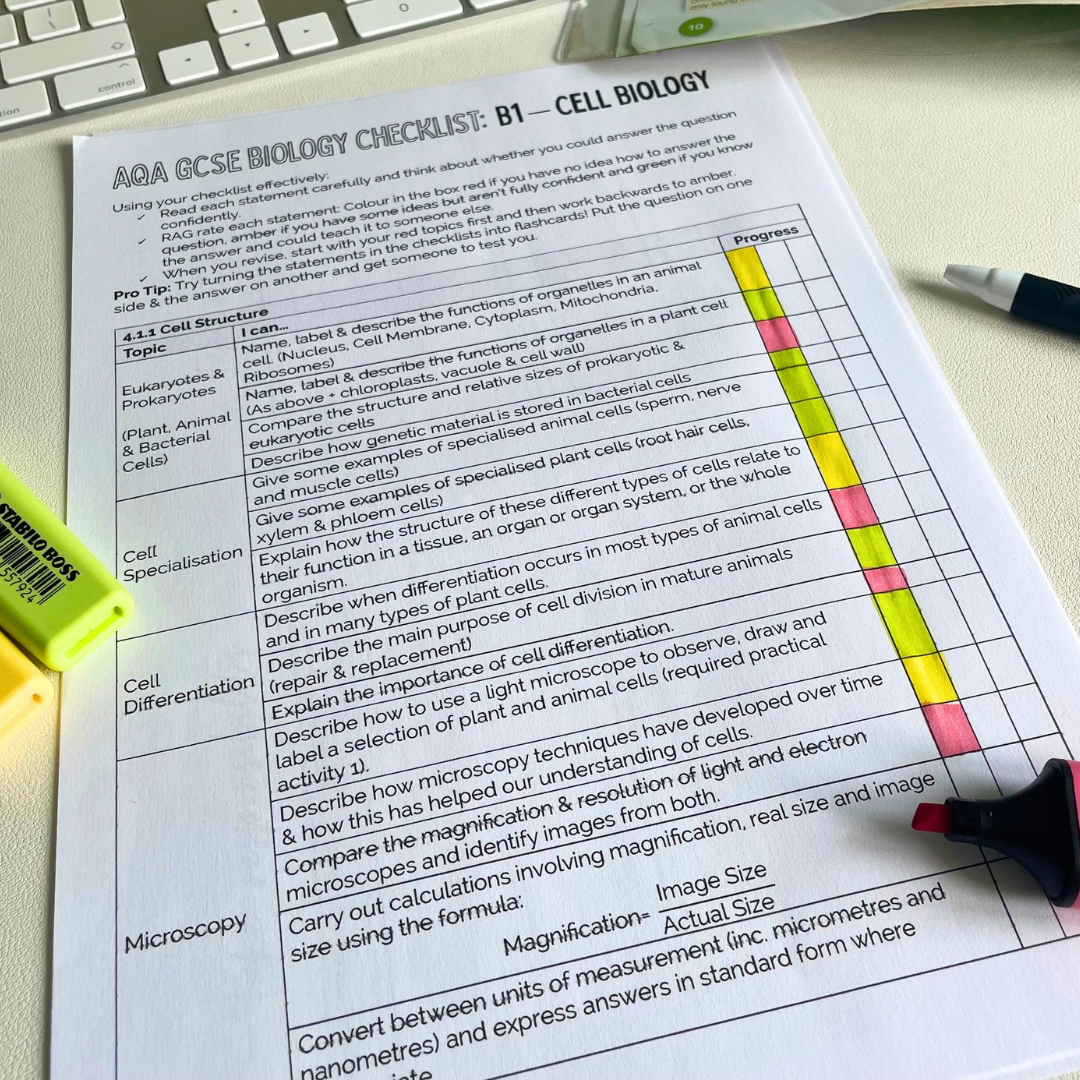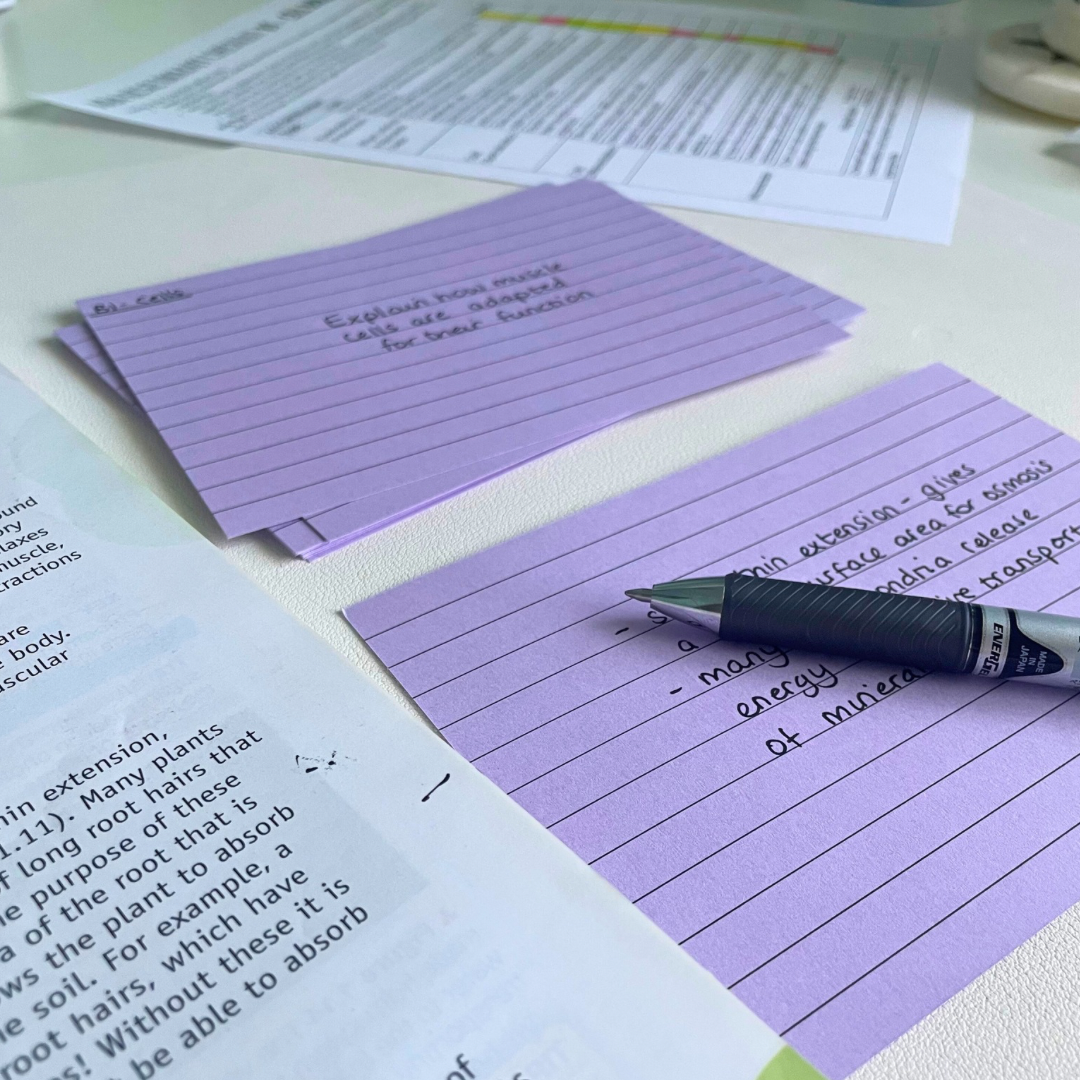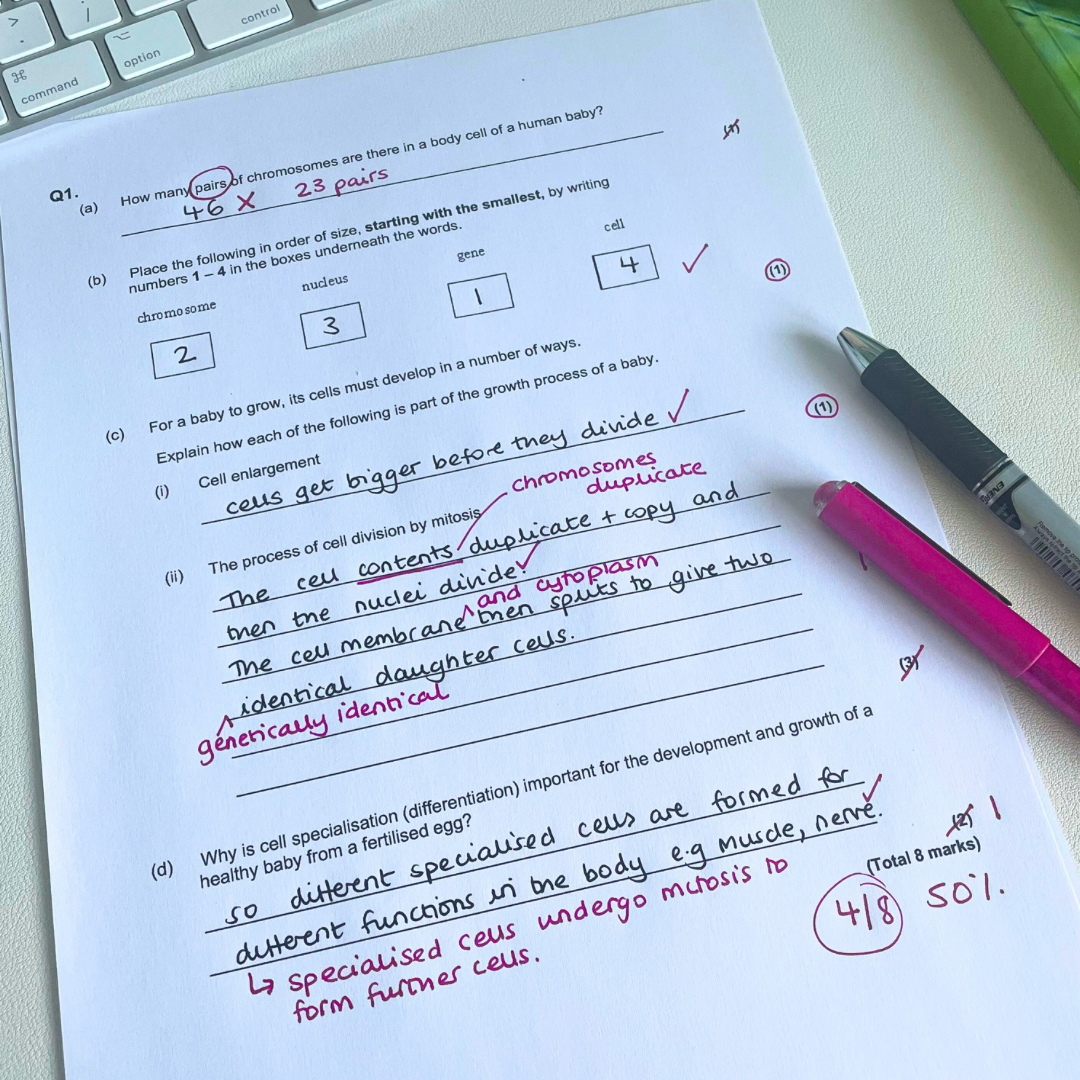How to Revise for GCSE Biology
Hi! I'm Caroline - Specialist Biology tutor, qualified teacher & examiner.
The number one thing that GCSE (& A-Level) students say to me is: “I don’t know how to revise!”.
They’re bright and motivated but when it comes down to revision, they feel overwhelmed and insecure. So they either end up doing the wrong thing….or nothing at all. Neither of which get them the results they really want in their hearts. They lose confidence and it becomes a vicious cycle.
I wanted to make it simple for them. I wanted to give them the tools to succeed. So, I developed this 3-step process to revise effectively and efficiently for GCSE Biology based on my experience as a tutor, examiner and classroom teacher for 10 years .
It’s worked, time and time again. For my Grade 9 students. For my Grade 5 students. Even for students that aren’t taking Biology (yes, you can use these strategies in other subjects too!)
We’ll cover everything from getting started to pro-tips to secure a top grade. I’ll also give you some things to look out for along the way: mistakes I’ve seen students make time and time again that you can avoid!
Ready? Let’s go! Here are the 3 steps to revise GCSE Biology:
Step #1: Diagnosis
Before you even open your revision guide, you’ll want to take your time with this critical first step. It sounds scary (what are you diagnosing me with?!) but it’s actually really simple: you just need to identify exactly WHAT it is that you need to revise.
I know, I know, it sounds obvious. But too many students make the mistake of just revising the topics they like, or inefficiently revising chronologically from start to finish, rather than focussing on their weakest areas first. Nobody likes feeling ‘bad’ at something but embracing your challenging topics first is a surefire way to boost your grade.
Here’s what you need to do:
Firstly, check which topics are on the exam you are taking.
Use the specification or a good topic checklist to RAG rate each sub-topic:
Colour or highlight each point depending on how confident you feel. Red = Weakest, don’t know this. Amber = Some knowledge but not 100% confident. Green = Know this well enough to explain to someone else. 100% Confident.
You can also use previous tests, assessments and classwork involving exam questions to identify weaker areas. This is particularly useful to identify exam skills you need to work on rather than content - for example analysing graphs or 6 mark questions.
💡Pro Tip: Try turning the checklist into a set of flashcards to test your knowledge in the next step. Put the question on one side and your answer (from your revision guide or textbook) on the other and get someone to test you.
What not to do
Skip this step! This is often the difference between a Grade 9 student mindset and a Grade 7 - they embrace their weaknesses and proactively work on them.
Start at the beginning of your revision guide and then work forwards in chronological order. This is inefficient and means you may not cover what you really need to work on.
Only revise the topics you like and find easy, whilst ignoring the ones you find more boring or difficult.
Step #2: Therapy
This is where you’re going to start making real progress. It’s also the part that requires some hard work and effort (sorry, there’s no magic wand!): You need to ensure you understand and can remember the content and skills needed for the exam.
I’d approach revision for understanding and remembering differently - you’ll need to decide which you need to focus on and it may differ between topics. Once you understand it, then you can work on getting it into your long term memory! You have to use active recall techniques to make this effective. Passively reading your textbook or scrolling revision websites won’t make the knowledge stick in your brain.
Here’s what you need to do:
If you need help understanding the content, try:
Watching a YouTube video on the topic (Cognito, Science with Hazel, SnapRevise, Freesciencelessons, Miss Estruch Biology…there’s so many great channels!)
Teaching it to someone else! Grab a brother, mum, dog… and try to explain it to them.
Mind maps - put a key topic in the middle and branch out to different ideas or facts, trying to make links between them. This works really well to see the links between key areas at the end of your Biology course.
Joining one of my small group revision sessions, where we take time to ensure deep understanding of the GCSE Biology syllabus.
If you need to focus on remembering the content, try:
Making flashcards - a question or key word on one side and an answer or definition on the other. Keep them short and sweet and get someone to test you regularly.
Blurting - this is essentially a bit of a ‘look, cover, check’ activity! Read a relevant section of your revision guide and then grab a whiteboard or scrap piece of paper. Write down (or ‘blurt!) everything you can remember and then check back with your revision guide. Write anything you missed in a different colour. Repeat after a few days until you don’t miss any information or key words. You could combine this with mind-mapping.
Making mnemonics, songs or silly phrases to help you remember things. For example, ‘King Phillip Came Over For Great Spaghetti’ can help you remember the groups we classify living things into (Kingdom, Phylum, Class, Order, Family, Genus, Species)
💡Pro Tip: Sort your flashcards into piles as you use them. If you get an answer wrong, put it in one pile and re-test yourself in a few days. If you got the answer ‘sort-of’ right, put it in another pile and test yourself next week. If you got the answer right, put the card aside and wait a few weeks to test again.
This is usually where people start shouting at the screen: “What about all the pages of notes I’ve made?!”. Well, whilst I think it’s a good thing to have detailed notes to refer back to… unless you’re testing yourself on them regularly they may not be helpful to your revision. Copying sections from a textbook or revision guide can often fool us into thinking we remember things when actually we don’t. Actively engaging our brains is key.
What not to do
Just watch YouTube or read your textbook without actively engaging your brain.
Worry about how it looks. You don’t need perfect handwriting, calligraphy titles and matching stationary to revise effectively. A pen, a paper and a highlighter is all you really need.
Controversial, but I’d say stay offline for this unless you’re very disciplined! Put your phone in another room, set a timer for 30 minutes and just get it done. Online flashcard apps etc can be great but there’s also a LOT of distractions around. Be honest with yourself - are you going to fall down a TikTok scroll hole instead of revising? If the answer is even a maybe, lock that phone away! :P
Try to study everything all at once. Try making a revision or study timetable and break it into realistic chunks to avoid feeling overwhelmed.
P.S. These techniques don’t just work for Biology! Give them a go for your other content-heavy GCSE subjects too.
Step #3: Testing
Are you starting to feel bit more in control? Like you have a plan? I hope so. We’re just about there. Your final task is to check your revision has actually worked by testing yourself using exam questions.
Many students feel anxious completing exam questions, and that’s perfectly normal. They’re challenging! But remember, this is how you improve and the more you practice, the better you’ll become.
Completing exam questions allows us to focus in on the specific phrasing on the mark schemes, the patterns in questions and answers and the exam technique we need to be successful. Just be patient and stay with it!
Here’s what you need to do:
Find a set of exam questions that matches the topic(s) you’ve been studying.
You can get sets of topic based questions at websites like Physics and Maths Tutor, Cognito and Access Tuition.
Or you can download full past papers from the relevant exam board’s websites - for example AQA
Complete the questions. If you can, do it in timed, exam conditions (no peeking at your notes!). Work on around 1 minute per mark for GCSE.
Finally, mark them using the mark scheme. Doing this in a different colour can help draw our attention to the specific words or phrases needed. Watch out for underlined or bold words in the mark scheme - these are needed for the mark.
💡Pro Tip: Don’t just forget about the questions once you’ve completed them! Try making a flashcard for any questions you’ve got wrong - with the mark scheme on the other side. Or try another set of questions on a similar topic or skill.
If you want some extra exam technique help from an experienced teacher and examiner, why not join one of my small group tuition sessions? Every week we look at a particular style of question, command word, maths or practical skill and break down what you need to do to get full marks.
What not to do
Just copy the answers from the mark scheme or textbook sitting next to you. Remove the comfort blanket and only look once you’ve completed the questions!
Ignore the mark scheme. Learning the specific words or phrases you need to use is essential. Some questions (describing mitosis for example) always have similar, if not the same, marking points.
Move on and never come back to the areas you got wrong (see my pro tip above!)
Key Takeaways
Diagnose your weaknesses using checklists and previous assessments
Use active recall techniques to revise and remember key content.
Ensure you’ve learnt the content & skills and can apply it using exam questions.
Repeat as needed! This is not a one-and-done situation - keep re-evaluating your knowledge and planning improvements.
I’ve given you all my best tips, tools, and techniques to help ensure your success. Just knowing them isn’t enough, though. It’s time to act and get the exam results you’ve been dreaming about.
And if you need some help along the way, don’t forget about my GCSE Biology group tuition and masterclasses: these sessions are designed to evaluate your knowledge, boost your confidence on tricky topics and help you master your exam technique to write full-marks answers in your exams.
Now, over to you. Have you tried any of these steps? Let me know how it worked out in the comments!




